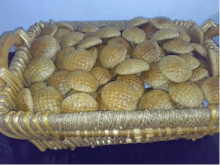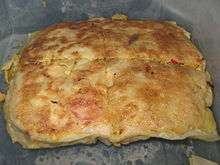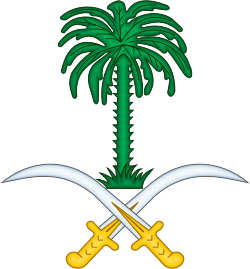Saudi Arabian cuisine
Saudi Arabian cuisine (Arabic: المطبخ السعودي) encompasses the cuisines and foods of Saudi Arabia. In spite of the existence of many common dishes, Saudi Arabian dishes vary from a region to another as the culture itself varies.[1]
Traditional cuisine
Foods and dishes
Some of the common food items in Saudi Arabian cuisine include wheat, rice, lamb, chicken, yogurt, potatoes, seafood and dates.
Some additional foods and dishes include:
Beverages
Traditional coffeehouses (Maqha) used to be ubiquitous, but are now being displaced by food-hall style cafes. According to the Saudi Arabian Cultural Mission, "serving Gahwah (Coffee) in Saudi Arabia is a sign of hospitality and generosity". Traditionally, the coffee beans were roasted, cooled and ground in front of the guests using a mortar and pestle. The host would then add cardamom pods to the coffee beans during the grinding process. Once the coffee was brewed, it would be poured for the guests. Today, though, Gahwah is not prepared in front of the guests; instead it is elegantly served in a Dallah and poured into small cups called Finjan.[2]
Yoghurt is normally made into a drink called Laban[3]
Sobia is a cold drink usually made in the Hijaz but now available all over Saudi Arabia especially during Ramadan. It's made from a light fermented mixture of Barley/Brown bread, Date palm sap, Herbs and Spices. It may be either white or colored depending on the flavor. It's also found to have health benefits.[4]
Islamic dietary laws
Islamic dietary laws forbid the eating of pork and the drinking of alcoholic beverages. This law is enforced throughout Saudi Arabia. According to Islamic law, animals must be butchered in a halal way and blessed before they can be eaten.
According to the Saudi Arabian cultural mission, "guests are served hot coffee and dates as a symbol of generosity and hospitality. The same practice is carried out in the month of Ramadan. Muslims in Saudi Arabia break their fast with dates, water and Arabian coffee. The caffeine in the coffee and the carbohydrates and iron in dates nourishes the fasting person with a lot of energy. This helps them perform the Tarawih held in the evenings during Ramadan."[2]
See also
References
- "Saudi Arabia profile". November 23, 2018 – via www.bbc.co.uk.
- "History of food in Saudi Arabia" (PDF). Sacm.org. Retrieved 20 November 2014.
- "Smoked Laban - Ya Salam Cooking". 7 October 2011. Retrieved 28 June 2016.
- "Sobia: A thirst-quenching Ramadan drink - islam.ru". Retrieved 28 June 2016.
Further reading
- Davies, Catriona. "Saudi foodies ditch fast food for fine dining." CNN. Wednesday March 28, 2012.



